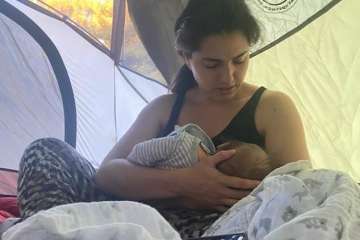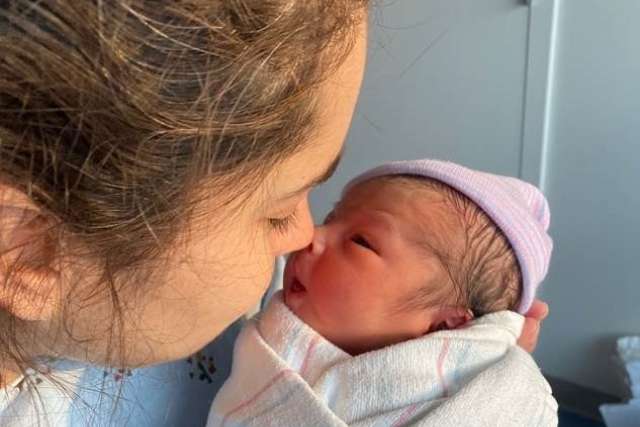Not everything went as planned when Michelle Fonseca gave birth to her son, Santos, in 2021.
Santos was born at Ronald Reagan UCLA Medical Center with jaundice – a condition that causes a baby’s skin and eyes to have a yellow hue – and was readmitted to UCLA Santa Monica Medical Center three days after his birth.
On the pediatric floor in Santa Monica, a shaken Fonseca was struggling to breastfeed. “It is the most natural thing in the world but when you have to do it, it's not instinctive at all,” Fonseca said.
It was there that Fonseca met Debora Brechesi-Milioni, an International Board Certified Lactation Consultant (IBCLC), who helped her breastfeed during this critical period.
Brechesi-Milioni taught Fonseca valuable skills such as trying different positions that suited her and her newborn, showing her latching techniques, teaching about active feeding, and explaining her son’s cues for feeling hungry or satisfied. With the help of Brechesi-Milioni, Fonseca found a rhythm and felt confident to feed her son.
UCLA Health offers lactation services before birth and in the inpatient and outpatient settings. The lactation team also offers weekly virtual group and weekly in-person meet-ups. Parents are encouraged to attend and take advantage of the opportunity to present questions to each other and a lactation consultant.
Health organizations recommend that newborns be exclusively breastfed for the first six months due to an array of health benefits, including lowering the risk of breast cancer for the mother and protecting the baby against obesity, diabetes and respiratory illness during childhood.
Ongoing help
Brechesi-Milioni noted that breastfeeding is not a fixed skill, and a parent may need to modify techniques as the baby grows and develops.
“Things change every day, every week and every month, and mothers need to navigate these changes,” Brechesi-Milioni said. “What worked when your baby was a newborn may be different when they are 6 months old.”
In fact, when Santos was 3 months old, Fonseca was experiencing latching issues and scheduled an in-person lactation consultation. Brechesi-Milioni helped her find new positions for this new stage.
Because of the numerous benefits provided by breastfeeding – such as releasing hormones into the parent’s body to aid relaxation and reducing the risk of Sudden Infant Death Syndrome (SIDS) – Fonseca was keen on continuing her breastfeeding journey after three months. Her motivation, however, did not translate into an easy experience.

“I was sleep-deprived but every time I wanted to quit, I reached out to Brechesi-Milioni and her instructions helped me breastfeed,” Fonseca said.
Although Fonseca wanted to exclusively breastfeed, she and Brechesi-Milioni stress that every woman’s choice to breastfeed, use formula, use both, or pumped milk is personal and should be tailored and informed to fit the individual’s needs, preferences and goals.
UCLA Health lactation consultants help parents with a variety of feeding goals.
“Our aim is to provide information for the family and have that family make the best decision for themselves,” Brechesi-Milioni said.
Fonseca had a phone consultation with Brechesi-Milioni when Santos was 6 months old and again at 9 months old, and she attended the weekly online group six times. After a baby reaches six months, solid foods are introduced to complement the baby’s diet, so Fonseca had to continue learning how to modify her breastfeeding patterns.
Brechesi-Milioni said she was impressed by Fonseca’s ongoing determination and persistence throughout her breastfeeding journey, especially in light of her difficult start to motherhood.
Fonseca credits Brechesi-Milioni and the weekly conversation with other parents for helping her continue to breastfeed until Santos reached 11 months old, and she is thankful for all the help she received.
“I wasn't lucky because I had a lot of milk and I wasn't lucky because it was easy for me,” she said. “I was lucky because I had help. I was lucky to have those resources.”



